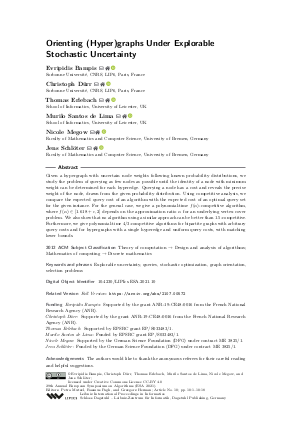@InProceedings{bampis_et_al:LIPIcs.ESA.2021.10,
author = {Bampis, Evripidis and D\"{u}rr, Christoph and Erlebach, Thomas and de Lima, Murilo Santos and Megow, Nicole and Schl\"{o}ter, Jens},
title = {{Orienting (Hyper)graphs Under Explorable Stochastic Uncertainty}},
booktitle = {29th Annual European Symposium on Algorithms (ESA 2021)},
pages = {10:1--10:18},
series = {Leibniz International Proceedings in Informatics (LIPIcs)},
ISBN = {978-3-95977-204-4},
ISSN = {1868-8969},
year = {2021},
volume = {204},
editor = {Mutzel, Petra and Pagh, Rasmus and Herman, Grzegorz},
publisher = {Schloss Dagstuhl -- Leibniz-Zentrum f{\"u}r Informatik},
address = {Dagstuhl, Germany},
URL = {https://drops.dagstuhl.de/entities/document/10.4230/LIPIcs.ESA.2021.10},
URN = {urn:nbn:de:0030-drops-145910},
doi = {10.4230/LIPIcs.ESA.2021.10},
annote = {Keywords: Explorable uncertainty, queries, stochastic optimization, graph orientation, selection problems}
}

 Creative Commons Attribution 4.0 International license
Creative Commons Attribution 4.0 International license



























